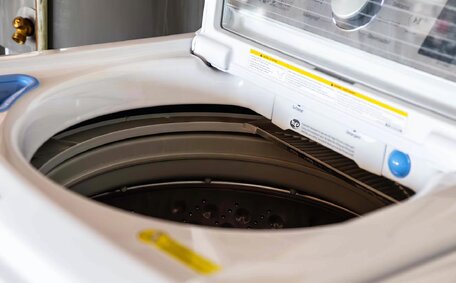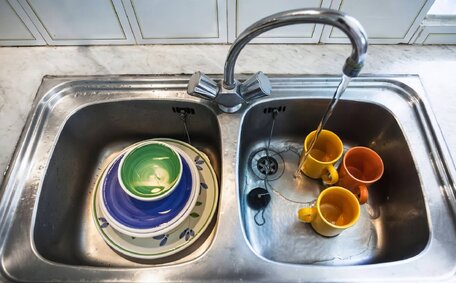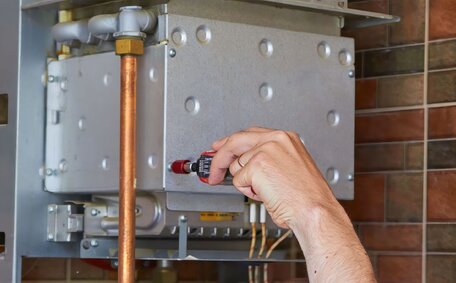Confirming Licensure and Credentials
Ask the gas fitter if their license is current and valid. In Australia, licensed gas fitters must complete comprehensive training and assessments to work legally. Verifying their credentials is essential for the safety of your home’s gas systems and reassurance of their competence. Confirm the plumber’s licence status using relevant online registries.
Ensure the gas fitter’s license is appropriate for the work required in your region as licensing criteria differ across states and territories.
Verifying Insurance and Certifications
Inquire about the gas fitter’s insurance coverage and any additional certifications they possess to ensure that they are fully qualified to handle the job. Check if the tradesperson has comprehensive insurance and bonding, such as liability cover and workers’ compensation, to safeguard against job-related incidents. The plumber should issue current safety certificates, demonstrating compliance with stringent safety norms and high-quality work. Confirming insurance and certifications is essential for quality assurance and the safety of your plumbing systems before finalising your choice.
Request the specifics of their insurance to ensure they’re adequately insured and bonded, offering additional security for their work.
Requesting References and Past Work Examples
Before committing, it’s prudent to ask the plumber for references from past clients to verify their expertise. Gather firsthand testimonials of their work quality, professionalism, and timeliness, as this feedback is crucial when selecting a gas fitter. Ask these important questions for a complete evaluation before deciding:
- Were you satisfied with the completed work?
- Did they finish the job on schedule and on budget?
- How did they handle any unexpected issues or changes to ensure they could still do job effectively?
- An essential question is whether you would consider rehiring the plumber for further gas fitting work.
Inquiring about examples of prior projects is a part of the questions ask plumber before you consider hiring a tradesperson for your gas fitting needs. It’s good practice to ask about a gas fitter’s previous work before hiring a plumber as it can highlight their competencies with gas line installations, repairs, or appliance hookups. Review any provided photos or videos to assess the cleanliness, precision, compliance to codes, and overall quality of their gas services before you decide to hire plumber.
Understanding Pricing and Getting Quotes in Writing
Understanding a gas fitter’s pricing structure is critical; ensure they provide well-documented and detailed quotes. There are typically two main pricing structures:
- Hourly rate - The gas fitter charges an hourly rate for work completed, which can vary. Ensure they are transparent about their hourly fees in line with market rates. To figure out your costs, ask your plumber how much and make sure they clearly state their rates, with the average ranging from $50-150 per hour.
- Fixed price - Alternatively, the gas fitter may offer a flat rate for the complete project, encompassing all labour and materials without hidden costs. For a gas line installation or appliance hookup, a residential plumber may charge a fixed price ranging from $250 to $750, depending on the scope of work.
Approach vague verbal quotes with caution and insist on a written quote to avoid ambiguity and ensure a clear outline of the overall cost. Always get quotes in writing detailing exactly what is covered and the terms of payment. Before locking in your choice, you need to know what extra expenses such as permit fees or specific parts might be your responsibility, beyond what’s included by the plumber.
Ask questions over phone if the quote seems unclear or includes fine print you dont want to overlook. You have questions need discuss respectfully if a fixed price is higher than anticipated, ensuring it doesn’t overstretch your budget. Ensure the plumber specifies the services included in the quote to prevent future misunderstandings.
Asking About Specialized Services Offered
When hiring a gas fitter, you need to ask your plumber about their experience to ensure they can work your home appropriately, fulfilling specific requirements before any commitments are made. For example, ask:
- Do you install gas lines and appliances in new constructions?
- Can you service tankless water heater systems or other specialised gas equipment?
- Do they offer 24/7 services as a reassurance for plumbing emergency leak detection and repairs?
- What safety inspections and leak tests do you offer to guarantee the integrity of the installation?
By asking targeted questions, you can clarify the plumber’s abilities and ensure they match your requirements. Understand that plumbers vary in expertise, so inquire if they specialise in areas such as gas line rerouting or servicing modern condensing boilers. Ensure you’re seeking referrals with thoughtful inquiries targeting plumbers who demonstrate particular expertise for jobs requiring niche technical know-how or certifications.
An established gas fitter will openly discuss their range of plumbing repair services offered. This ensures you can help identify someone properly qualified for your specific gas fitting needs, whether installing appliances or performing intricate repairs.
Discussing Warranties and Guarantees for Work Completed
Ensure they offer warranties or guarantees on their workmanship to address any faults promptly and prevent unresolved issues. Reputable plumbers provide a warranty, typically ranging from 6 to 12 months, covering defects in materials or labour and demonstrating a commitment to rectifying issues. Take care to ensure they provide warranties rather than risking engagement with overly brief warranty periods, crucial to secure the job done before hiring a plumber.
A comprehensive warranty offers peace of mind, assuring that any issues will be promptly resolved, reflecting the plumber’s adherence to high workmanship standards. If an issue arises due to an error on their part, they are responsible for taking action to promptly address and fix the problem at no additional cost within the warranty timeframe. Typical warranty coverage, akin to a swift delay scroll 50 milliseconds fix, would encompass:
- Gas line leaks
- Improper appliance installations
- Faulty part replacements
- Code violations
When discussing warranties, it’s advisable to ask important questions to your plumber, ensuring a clear understanding of details like:
- What is covered under your warranty?
- How long does coverage last?
- What steps do I take to address a warranted issue?
Ensure to pose relevant questions before and confirm any warranty terms are documented in writing. This protects you if problems develop down the road requiring repairs under the gas fitter’s guarantee.
Clarifying Emergency Availability and Clean-up Policies
Ascertain the plumber’s availability to deal with emergencies outside regular hours. When faced with a plumbing crisis, reliable outfits offer services even after regular business hours, ensuring there’s always someone on-call to assist. Be sure to ask:
- Do you provide more than just regular services by offering after-hours emergency gas leak and repair services?
- What is your typical response time to emergency situations, a critical aspect of what your plumber should clearly communicate?
- Do they charge different rates for emergency calls compared to regular hours, as this is a vital detail homeowners need to be aware of?
It’s necessary to ask specific questions to determine their clean-up protocols and set exact job expectations. Inquire about their process for tasks like gas line installations and appliance fittings, especially in areas prone to dust and debris collection. you should ask the plumber before hiring about:
- How do you clean the work area upon job completion?
- A question should ask includes: Do you provide protective coverings for floors and furniture?
- What steps are taken to minimise impacts on daily home life and activities?
A skilled gas fitter should confidently manage urgent plumbing issues at all times and ensure thorough site clean-up after work completion.
Reviewing Payment Schedules and Methods
Discuss the payment schedule and methods with the gas fitter upfront to avoid unexpected financial issues. Addressing This promotes transparency that lapses into your scope of work that needs to be done in residence, aiding in curtailing unexpected financial predicaments and eliminating 0var isform formcontentlength issues.
Ask questions like:
- Do you charge a deposit to begin work? If so, what percentage of the total could be indeed needed to fix problem areas during progress?
- What milestones trigger progress payments throughout the job?
- When is the final payment due upon the plumber completing the work?
- What forms of payment do you accept?
A reasonable deposit a local plumber can give would be around 20-30%. Any higher may be a red flag indicating false data formid. Progress payments tied to defined project milestones (like equipment delivery, installation, testing, etc.) are typical.
Final payment is usually due upon work completion, after the plumber has walked you through the finished product and provided all safety certifications. Avoid having a situation where your job is not complete yet the plumber is asking for full payment prematurely.
Confirm that the plumber’s accepted payment methods (cash, cheque, card, bank transfer, etc.) are convenient for you. Outlining these expectations upfront fosters accountability and clarity to avoid any misunderstandings that could end up costing you.
Estimating Project Timeframes
Confirm the anticipated project duration with the gas fitter at the start. Understanding the timeline helps coordinate the work on your property and prevents schedule conflicts.
Critical questions about project timeframes to ask include:
- Could you estimate how long the gas line installation/appliance hookup/repair will take, from start to finish?
- Can you offer a detailed timeline with key milestones and completion goals?
- How will any delays in plumbing function be managed to minimise disruption in your home when unforeseen challenges emerge?
- Do you charge extra fees if the job takes longer than your estimate?
Request accurate estimates and schedules devoid of misconceptions from the plumber to ensure precise project timelines. They can clarify their scheduling procedures and policies around unforeseen timeline changes.
Grasping time expectations is vital when professionals are working your gas systems; it includes streamlining access, making enlightened choices, or assessing the conducted work. Confirming schedule flexibility and potential impacts on pricing prevents "sticker shock" if days on the job increases.
Discussing timeframes upfront sets clear expectations so you can plan your schedule and budget without the concern of encountering any discrepancies, ensuring the clear data formid matches the plumbing service being provided.






